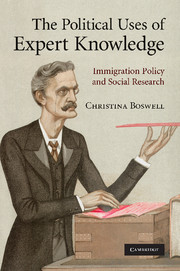Book contents
- Frontmatter
- Contents
- List of figures and tables
- Acknowledgements
- I The political functions of knowledge
- II The case of immigration policy
- 5 The politics of immigration in Germany and the UK
- 6 The British Home Office
- 7 The German Federal Office for Migration and Refugees
- 8 The European Commission
- 9 Organizations and cultures of expertise
- III Extending the theory
- References
- Index
5 - The politics of immigration in Germany and the UK
Published online by Cambridge University Press: 15 December 2009
- Frontmatter
- Contents
- List of figures and tables
- Acknowledgements
- I The political functions of knowledge
- II The case of immigration policy
- 5 The politics of immigration in Germany and the UK
- 6 The British Home Office
- 7 The German Federal Office for Migration and Refugees
- 8 The European Commission
- 9 Organizations and cultures of expertise
- III Extending the theory
- References
- Index
Summary
Germany and the United Kingdom both saw major new initiatives to reform immigration policy in the period 2000–3. In both cases, centre-left governments endeavoured to introduce more liberal labour migration policies, justified on essentially technocratic grounds. The new policies were justified as a means of addressing labour and skills shortages, and enhancing competitiveness in a knowledge-based economy. This period also saw the establishment of new research programmes in the government agencies responsible for immigration policy in each country, again implying a shift towards a more technocratic style of debate and decision-making.
Chapters 6 and 7 will be devoted to exploring the rationale behind, and dynamics of, these two new research programmes. Before turning to the administrative context, however, this chapter will look at patterns of research use in public debates around these reforms. This will enable us to explore some of the ideas developed in the previous chapter on the functions of expert knowledge in political debates. How, if at all, did politicians and the mass media make use of knowledge in argumentation? Did debates revolve around risk, steering or verification of the impact of policies? And how far did participants accept the authority of knowledge claims in political debate? The analysis of public debates will help set the scene for our examination of knowledge use in the administration. It should provide some insight into the political pressures these agencies experienced in developing and implementing the new immigration policies, and especially expectations about the role of expertise in decision-making.
- Type
- Chapter
- Information
- The Political Uses of Expert KnowledgeImmigration Policy and Social Research, pp. 107 - 129Publisher: Cambridge University PressPrint publication year: 2009
- 1
- Cited by



